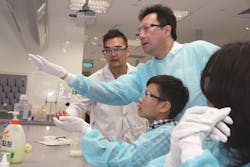Dow Helps Students Use STEM Skills to Build Sustainable Future
Dow has joined with WE, an organization that makes doing good, doable, and created a program called WE are Innovators. The goal is to get kids using STEM disciplines to tackle “today’s daunting issues of food waste, the environment and more by applying chemistry, science and innovation.”
Youth from both the U.S. and around the world submitted applications to the campaign, sharing how they would apply science and chemistry to make life-changing impacts on today’s major issues. Seven schools received transformative grants to bring their social innovation to life.
As part of the process, the students were mentored and coached by Dow STEM Ambassadors, a group of employees invested in engaging students in STEM.
“The goal of WE Are Innovators is to empower all youth to use their STEM skills to innovate solutions for today’s and tomorrow’s challenges,” said Jim Fitterling, Dow CEO.
“Dow believes it is critical to inspire a steady pipeline of innovative and competitive future leaders who believe in the importance of innovation, sustainability, and serving their communities to improve society locally and globally,” added Fitterling. “Our partnership with WE, and the We Are Innovators campaign, brings STEM to life in schools and introduces how science – when combined with critical thinking and creative problem-solving – can change the world.”
In its first year, the campaign was piloted in Midland, Mich.; Plaquemine, La.; Pottstown, Pa.; Freeport, Texas and in the Rayong Province in Thailand. the campaign will be expanded to all interested schools in the Fall of 2018.
Highlights from the winning applications include:
Robert Brownyn, Midland High School, Midland, Mich.
Passionate about clean water and food sustainability, Robert is awarded the opportunity to join WE and Dow on a volunteer trip to Ecuador thanks to his innovative water conservation system and school garden model. The water system will gather and filter rainwater to be bottled and distributed to local community members who currently lack access to fresh drinking water. A school garden will also be implemented campus-wide to inspire sustainable food practices, moving away from disposable snacks and replaced with healthy, waste conscious options available at the school’s cafeteria.
Students of Pottstown Middle School, Pottstown, Penn.
Tackling the issue of water and environmental sustainability, Pottstown Middle School is awarded a $5,000 grant towards the construction of a riparian buffer installation in Pottstown’s Memorial Park, home to the Manatawny Creek with damaged and polluted water banks as a result of frequent community use. A riparian buffer installed at bank edges without plants or large rocks leaving soil bare will help improve water quality by intercepting pesticides, sediments and help stabilize the water bank.
Jared Dalyn, MSA West High School, Plaquemine, La.
Responding to the issue of food waste, Jared is awarded the opportunity to join WE and Dow on a volunteer trip to Ecuador thanks to his initiative to build a sustainable school garden and compost site. Fruits, vegetables and compost garnered from Jared’s initiatives will then be sold to local vendors, with the profit donated back into the community. For maximum impact, Jared will also galvanize the community to support his project by illustrating the effects of food waste and offer daily tips to reduce waste.
Students of Brazosport High School, Freeport, Texas
Taking on the issue of environmental protection, Brazosport High School is awarded a $2,500 grant for introducing community innovation through their design of a native prairie land in an urban setting. Their innovation will reintroduce native plants to the area and attract local wildlife that have been displaced due to seasonal droughts and harsh winters. The space will serve a dual purpose as an integrative outdoor learning area for all students to enjoy.
Kanyanisa Narksawat, Rayongwittayakom School, Rayong Province, Thailand
To elevate STEM education and protect the environment, Kanyanisa has proposed the invention of a biogas system from the food waste in school. The new biogas system design will help the school save the cost of cooking gas and will generate the organic fertilizer for the school’s vegetable farm and garden. They can enhance their STEM learning to build the user-friendly biogas system, and this knowledge will be shared and leveraged to other schools and neighbor communities. Kanyanisa is awarded a $1,500 grant for her school and a volunteer trip to Ecuador for one teacher and two students.
About the Author
IW Staff
Find contact information for the IndustryWeek staff: Contact IndustryWeek
